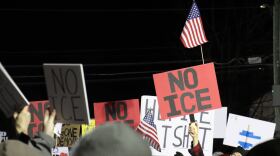Secretary of State Bill Gardner used his opening remarks at the inaugural meeting of the Trump administration’s voting integrity commission to call for closer examination of the value of photo ID laws and other measures that, he says, improve public confidence in elections.
Gardner, the nation’s longest-serving secretary of state, said his experience overseeing nearly 500 election recounts — 11 of which ended in ties -- showed him why it’s important to root out improper voting on any scale.
“I am a witness that every vote matters,” Gardner told the group gathered in Washington, “and there doesn’t need to be massive voter fraud to sway the outcome.”
Gardner’s appearance at the meeting garnered pushback from those who accused him of lending credence to a commission that could be used to enact stricter voting laws, given President Trump’s pattern of spreading unfounded claims about widespread voter fraud during the last election.
In his opening remarks, Gardner said he wants to find ways to increase turnout — but he doesn’t believe simply moving to make voting easier will achieve that goal.
“I would like more Americans to vote, not fewer,” Gardner said in his opening remarks. “For over a half-century, since the Civil Rights era of the sixties, our federal government and the states have been trying to find more and more ways to make it easier to vote.”
But, he added, “when states try to balance that ease of voting with measures to increase voting integrity, it is often met with hostile resistance and charges of suppression.”
Indeed, Gardner has been the target of just such resistance in New Hampshire over his support for measures like stricter voter identification requirements and Senate Bill 3, a new law adding additional layers of verification of voters’ identities after the election.
Gardner said the commission should focus its efforts on understanding why turnout has not increased despite the recommendations of multiple other federal panels over the last several decades.
“We also need to compare states that have voter ID laws with those without,” Gardner said. “I might add that the two highest states in turnout during the presidential primaries last year were both photo ID states.”
While Gardner is correct that those top two states — New Hampshire and Wisconsin — both have photo identification laws on the books, the rest of the states that garnered the highest turnout in the 2016 presidential primary include a mix of those with and without such laws.







